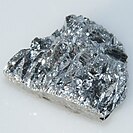From today's featured article
|
 A metalloid is a chemical element that has properties in between those of metals and nonmetals. There is no standard definition of a metalloid, nor is there agreement as to which elements are appropriately classified as such. Despite this uncertainty, the term remains in use in chemistry literature. The six commonly recognised metalloids are boron, silicon, germanium, arsenic, antimony (pictured) and tellurium. Elements less commonly recognised as metalloids include carbon, aluminium, selenium, polonium and astatine. Typical metalloids have a metallic appearance but are brittle and only fair conductors of electricity. Chemically, they mostly behave as weak nonmetals. They can form alloys with metals. Most of their other properties are intermediate in nature. Metalloids and their compounds are used in alloys, biological agents, flame retardants, glasses, optical storage and optoelectronics, pyrotechnics, semiconductors and electronics. The term metalloid originally referred to nonmetals. Its more recent meaning, as a category of elements with intermediate properties, became widespread in 1940–1960. Metalloids are sometimes called semimetals, a practice that has been discouraged. (Full article...)
Recently featured: Meerkat Manor – Madeline Montalban – Mucho Macho Man
|
Did you know...
|
From Wikipedia's new and recently improved content:
- ... that acquacotta (pictured), an Italian peasant food dating to ancient times, was originally devised to make stale bread palatable?
- ... that Martin Scorsese's first British film, Tomorrow, marks the directorial debut of his long-time script supervisor, Martha Pinson?
- ... that the Nagcarlan Church was first built from light materials in 1583 under the chaplaincy of Franciscan missionary Tomas de Miranda, who also pioneered the cultivation of wheat in the country?
- ... that John Calhoun, publisher of the first newspaper in Chicago, was originally apprenticed to be a carpenter in Watertown, New York?
- ... that Adolf Ulric Grill of the Swedish Grill family once traded a mounted moose for 60 rare birds?
- ... that the Carpathian newt sometimes hybridises with the smooth newt?
- ... that the tomb of Zu Dashou, a Ming dynasty Chinese general, is in Toronto, Canada?
|
|
|
In the news
|
|
|
On this day...
|
October 4: First day of Eid al-Adha (Islam, 2014); Yom Kippur ends at nightfall (Judaism, 2014); Feast day of St. Francis of Assisi (Catholicism)
- 1779 – American Revolution: James Wilson and his colleagues were forced to defend themselves after a mob, angered by his successful legal defense of 23 people from exile, converged on his house, resulting in six deaths.
- 1895 – The first U.S. Open golf tournament was held on a nine-hole course at the Newport Country Club in Newport, Rhode Island.
- 1958 – The new constitution establishing the French Fifth Republic, France's current political regime, was introduced.
- 1976 – British Rail's InterCity 125 service (pictured), the world's fastest diesel-powered train, began operations on the Western Region.
- 2010 – The dam holding a waste reservoir in western Hungary collapsed, freeing 1 million cubic metres (1,300,000 cu yd) of red mud, which flooded nearby communities and killed at least nine people.
More anniversaries: October 3 – October 4 – October 5
|
|





